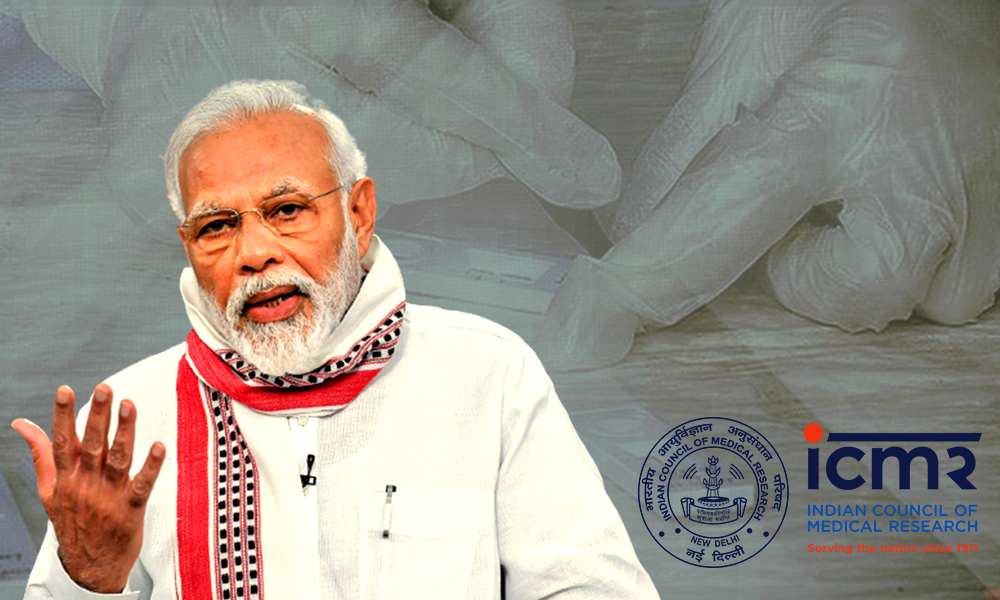
CREDITS: INDIATIMES
ICMR Was Blocked From Releasing Sero-Survey Data From Hotspots: Researchers
Writer: Devyani Madaik
A media enthusiast, Devyani believes in learning on the job and there is nothing off limits when it comes to work. Writing is her passion and she is always ready for a debate as well.
India, 21 Sep 2020 11:37 AM GMT
Editor : Shubhendu Deshmukh |
Shubhendu, the quint essential news junky, the man who loves science and politics in equal measure and offers the complete contrast to it by being a fan of urdu poetry as well.
Creatives : Abhishek M
" An engineer by profession, Abhishek is the creative producer of the team, graphic designing is his passion and travelling his get away. In more ways than one, he makes the content visually appealing."
Researchers said that the director-general of the ICMR, Balram Bhargava had directed them to remove the data collected between May 11-June 4, saying that the council did not have the approval to publish the findings from containment zones. Bhargava did not say who disapproved of the publication and why.
Researchers, who conducted India's first national seroprevalence survey in the population in May under government orders, for the prevalence of novel coronavirus, have alleged that they were not allowed to include data from containment zones in 10 cities in the paper they published the survey.
The Telegraph spoke to some of these researchers, who said that the director-general of the Indian Council of Medical Research (ICMR), Balram Bhargava had directed the researchers to remove the data collected between May 11 and June 4, saying that the council did not have the approval to publish the findings from containment zones. Bhargava did not say who disapproved of the publication and why. He himself co-authored the paper.
The paper was published in the Indian Journal of Medical Research this month.
The survey determined how many people were infected, where blood samples were collected from 400 random people in each of 70 districts, and 500 people from hotspots in each of 10 cities - Ahmedabad, Bhopal, Calcutta, Delhi, Hyderabad, Indore, Jaipur, Mumbai, Pune, and Surat.
The media spoke to seven of the 74 co-authors. Four of them spoke on the condition of anonymity while three spoke on the record.
"We were told: remove the hotspots data or don't publish," one of the co-authors said. The same co-author said that all were in a dilemma, whether to publish an incomplete paper or drop the publication in protest, but later decided to publish anyway.
The Telegraph also sent a questionnaire to Bhargava regarding the claims by the co-authors and requested his comment by Saturday afternoon. As of now, no reply has been received.
Following the directives, the researchers omitted the high prevalence rates found in the hotspots from their paper, including Mumbai's Dharavi with 36 per cent rate of infection, 48 per cent in Ahmedabad; 30 per cent in Calcutta.
Their paper only showed the lower prevalence rates in other districts, ranging from 0.62 per cent to 1.03 per cent — and a national average of 0.73 per cent in early May, reported the media.
However, the medical body's publication ethics clearly states that completed research, irrespective of results, must be published and shared on public databases or other available relevant platforms.
Blocking public disclosure of the high prevalence rates in the hotspots raised concerns among experts and researchers about its impact on science and the very breach of research ethics by the medical agency, which also writes medical ethics codes for India.
Samiran Panda, head of the council's epidemiology division and a co-author of the paper, supported the decision, saying that Bhargava said that information had been superseded by city-level seroprevalence surveys conducted in some of the 10 cities and would have just led to confusion. The state-level surveys had diminished the relevance of the containment zones' results from early May, she added
In contrast, D.C.S. Reddy, community medicine specialist and another co-author of the paper, said that data of containment-zones were important to understand the dynamics of transmission in areas with large infections. "As members of the surveillance group, we cannot say why the data was held back. The council can answer that," The Telegraph quoted him as saying.
"The pursuit of science is to look for the truth – suppressing research is illogical," another co-author and a member of the council's epidemiology and surveillance group for COVID-19, Jayaprakash Muliyil told the media.
Amar Jesani, a physician and editor of the Indian Journal of Medical Ethics, told the newspaper that removing the selective data out of the results distorts the paper's analysis and qualifies as a violation of research integrity. "These 5,000 people would have volunteered to give their blood samples because they believed the analysis would benefit science or society. Eliminating their data without good reason is troubling," he added.
Independent bioethics specialist, Anant Bhan told the media that removal of data from containment zones would also constitute a 'wasted research effort' through public funds. He said that research findings, whatever they are, need to be published as it is, especially during a pandemic.
Also Read: Watch: TMC MP Mahua Moitra Slams Centre Over Unaccountability Of PM-CARES In Lok Sabha
 All section
All section














